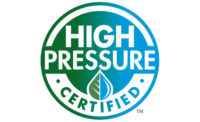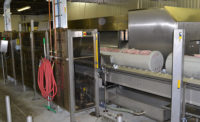Cold Pressure Council debuts HPP “High Pressure Certified” logo

High-pressure processing has been used as an additional food safety aid for everything from juices to deli meats. As consumer recognition of HPP benefits has increased, a trade group representing members of the HPP industry is raising the visibility of the process. The Cold Pressure Council debuted a new “HPP Certified” seal earlier this year that can be placed on the packaging of products that have undergone the HPP process.
The Cold Pressure Council consists of HPP equipment and packaging suppliers, food processors that utilize HPP in their operations and tollers that own HPP equipment and process other companies’ food products for a fee. The CPC introduced the new certification mark in April.
As the logo was recently introduced, it has yet to appear on a meat product package. However, the standards set by the CPC allow for use of the logo on any raw ground, raw not ground and fully cooked not shelf-stable food products. Companies that go through the required third-party auditing to use the seal must have a validation service with HPP experience, either in-house of through a lab affiliated with the auditing company, states the Council. Furthermore, the auditor that conducts the review of the CPC member process must have prior HPP experience.
Rise in HPP
High-pressure processing has grown in usage as processors continue to look at ways to reduce pathogens. As with any new technology, it can be difficult to explain the process to consumers.
“Most consumers probably don’t know what HPP is,” says Nicole Glenn, vice president of marketing for Applegate Farms. Applegate uses HPP on a variety of its products, including deli meat, bacon and hot dogs.
“On Applegate labels, we call out 'not preserved' and for some people who want to go deeper on what that means, they will call or email us or post a question on Applegate social media,” she explains. “That’s when we explain the HPP process and how it helps us to deliver a clean and safe food without having to use ingredients you wouldn’t find in your pantry – like dextrose or sodium lactate.”
Glenn says that HPP allows the company to deliver on its “clean, crave-able” foods, without using additives or affecting the taste, texture or nutritional value. When the company is asked about its HPP process, she says that the company refers to the process as a “super sealer” that uses a high-pressure chamber filled with water to seal in a food’s freshness and protect against spoilage. The takeaway the company wants its health-conscious customers to have is that the process is clean and safe.
“As an organic and natural food company, there are some tools and ingredients in the conventional food tool box that are not available to us – and HPP is a big part of overcoming those challenges,” she says.
Looking for a reprint of this article?
From high-res PDFs to custom plaques, order your copy today!







